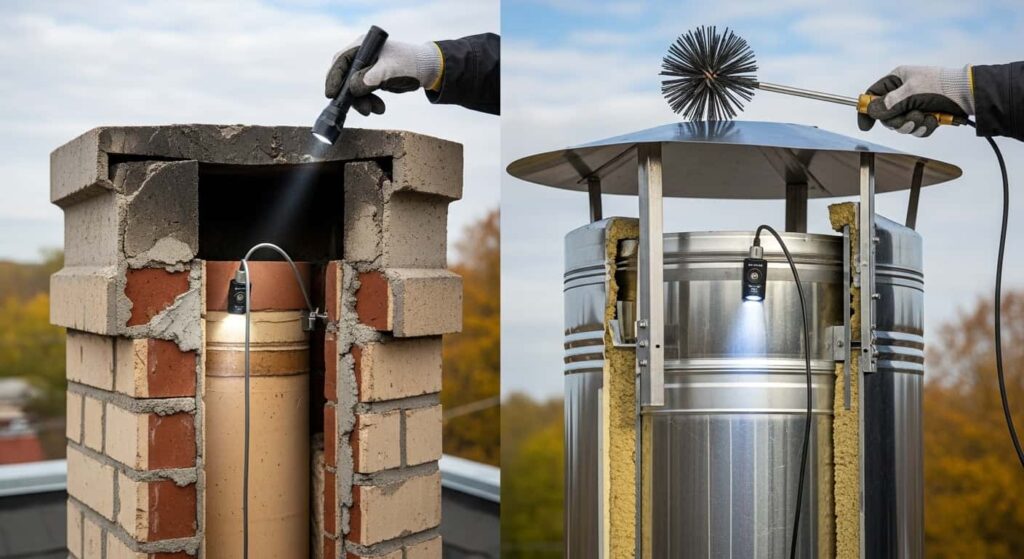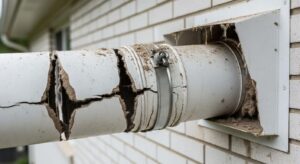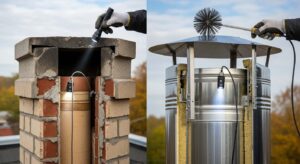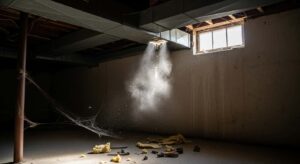Brick chimneys are beautiful, and they add so much character to your home. The only downside? Water, freeze-thaw cycles, and time can slowly destroy things in the most expensive ways possible. On the other hand, your neighbor’s boring metal chimney might outlast your mortgage. The quicker you accept the cruel reality that different chimney materials face completely different challenges when it comes to chimney inspection in NJ, the easier it gets. Here’s what you need to know.
Masonry Chimneys
Let’s start with the truth about masonry chimneys. They’re gorgeous. They add character to your home. They can last 100+ years when properly maintained. They also have more ways to fail than an ’80s computer.
If properly constructed and maintained, masonry chimneys can last up to 100 years, which sounds great until you realize that properly maintained means a lot of lug and pull on your part.
What Makes Masonry Inspections So Complicated?
When a chimney inspection NJ professional approaches a masonry chimney, they’re not just looking at one thing. They’re actually looking at an entire system of interconnected parts that all affect each other.
The crown, the cap, the flashing, the mortar joints, the bricks themselves, the liner, the damper, the smoke chamber, the firebox, the list goes on. Each component can fail independently or cause other components to fail.
If you miss even one small crack in the crown, six months later, you’re dealing with spalled bricks, damaged flashing, and water in the basement. It’s a lot of investigating to find the root cause of the problem.
Death by a Thousand Cuts
Inspecting a masonry chimney is so difficult because problems with your chimney almost never happen all at once. Instead, you get this slow disaster where small problems compound into big problems over months or years.
A tiny crack in the mortar lets in a little water. That water freezes and expands, making the crack bigger. More water gets in. The freeze-thaw cycle continues. Eventually, whole bricks start moving. The crown develops cracks. Water starts getting behind the flashing. The wood framing around the chimney starts rotting.
By the time homeowners notice something’s wrong, usually water stains on interior walls or white staining, which is usually referred to as efflorescence, on the exterior bricks, the problem has been developing for years, and the repair bill reflects that timeline.
What Chimney Inspection NJ Experts Look for in Masonry
So, since a masonry chimney inspection is really all about conducting an in-depth physical exam on the structure, here’s what they’re actually looking for:
- Crown and Cap Issues: The concrete crown at the top of your chimney is supposed to shed water away from the flue. Cracks here are like leaving your front door open during a rainstorm, which is obviously never a good idea.
- Mortar Joint Deterioration: This is the big one. Mortar is the weakest link in masonry construction, and New Jersey’s freeze-thaw cycles are brutal on mortar joints. Mortar tends to crack due to extreme temperature swings because of its weak tensile strength.
- Spalling Bricks: When water gets into bricks and freezes, pieces of the brick face pop off. It starts small but accelerates quickly once it begins.
- Flashing Problems: The metal strips where your chimney meets your roof are supposed to keep water out. When they fail, water goes places it was never meant to go.
- Interior Damage: Smoke chambers, fireboxes, and chimney liners take a beating from heat and combustion byproducts. Cracks here can be safety issues, not just maintenance problems.
Metal Chimneys
Metal chimneys are the opposite of masonry in almost every way.
They’re prefabricated, lightweight, relatively simple to install, and designed to be functional rather than beautiful.
Metal chimneys typically have lower insulation values than masonry chimneys, but they make up for it in other ways. They’re designed to handle high temperatures, resist corrosion, and provide reliable venting for decades with minimal maintenance.
Why Are Metal Chimney Inspections Different?
When chimney inspection NJ professionals inspect metal chimneys, they’re looking at an engineered system. Everything is manufactured to specific standards, installed according to precise specifications, and designed to work as a complete unit.
This makes some things easier. There are fewer variables, fewer custom elements, and problems tend to be more obvious when they occur. It also makes some things trickier because when engineered systems fail, they often fail in ways that affect the entire system’s performance.
All or Nothing
While masonry chimneys tend to degrade gradually, metal chimneys can go from working completely fine to completely shot relatively quickly.
A metal chimney might pass inspection for years running, then suddenly need complete replacement when corrosion finally breaks through or a storm damages the cap and allows water infiltration that ruins the insulation system.
What Inspectors Look for in Metal Systems
- Storm Collar and Cap Integrity: These parts work to keep water out of the chase and away from the chimney pipe. When they fail, problems develop quickly.
- Pipe Condition: Dents, corrosion, separation at joints, or damage from falling debris. Metal chimney pipes are more vulnerable to physical damage than masonry structures.
- Support and Clearances: Installing a metal chimney without considering the required clearances from combustibles can be a very dangerous mistake. Inspectors verify that support systems are adequate and clearances meet code requirements.
- Chase and Termination Issues: The enclosure around the metal chimney (if present) and the termination at the roof line are critical points where water infiltration commonly occurs.
- Insulation Problems: Metal chimneys rely on proper insulation for safe operation. One common mistake homeowners make when choosing a metal chimney is not ensuring that it’s properly insulated.
How Does New Jersey’s Climate Affect Both Types of Chimneys?
Living in New Jersey means your chimney deals with some serious weather-related stress. Here, your chimney experiences everything, from -1 degrees Fahrenheit to 101 degrees Fahrenheit, bitter cold winters, hot, humid summers, ice storms, heavy rain, occasional hurricanes, and plenty of freeze-thaw cycles that aren’t too great for building material.
How Weather Impacts Masonry
New Jersey’s climate is particularly hard on masonry chimneys. The freeze-thaw cycle is the big killer. When water gets into tiny cracks, it freezes, expands, and makes those cracks bigger. Repeat this hundreds of times over a few winters, and you’ve got serious structural issues.
Heavy rains test every seal, joint, and flashing detail. High winds can loosen caps and create negative pressure that affects chimney performance. Snow loading puts stress on the structure itself.
How Weather Impacts Metal
Metal chimneys handle freeze-thaw cycles better because they don’t absorb water like masonry materials do. However, they’re more vulnerable to wind damage, hail damage, and corrosion from acid rain and air pollutants.
Storm damage that might just knock some mortar loose on a masonry chimney can completely crush or separate metal chimney components. On the flip side, gradual water infiltration that might go unnoticed for years in masonry shows up quickly in metal systems.
How Frequently Should Chimneys Be Inspected?
The National Fire Protection Association recommends annual chimney inspections, but here’s what they don’t tell you: New Jersey’s climate makes that recommendation more critical than in gentler climates, and the inspection timing can make a huge difference in what problems you catch.
Masonry Chimney Inspection
For masonry chimneys, the best chimney inspection NJ timing is late spring or early summer, after winter’s freeze-thaw cycles have done their worst but before summer heat makes roof work dangerous.
This timing lets inspectors assess winter damage while repairs can still be completed before the next heating season. It also allows you, as a homeowner, to budget for repairs during the warmer months.
Metal Chimney Inspection
Metal chimneys benefit from fall inspections, before heating season starts, but after summer’s thermal stress has revealed any developing problems. This timing catches storm damage from summer weather and verifies that systems are ready for heavy winter use.
Metal chimney problems tend to be more binary; they either work properly or they don’t. There’s less gradual degradation compared to masonry, which makes timing less critical for catching developing issues but more critical for ensuring systems are fully functional when you need them most.
Can You Handle a Chimney Inspection in NJ on Your Own? Where to Draw the Line
Some chimney maintenance you can handle yourself. Some you absolutely cannot and should not. Here’s a quick look at how you can draw the line:
What Can You Do Yourself?
- Basic Visual Inspection: You can safely check your chimney’s exterior condition from the ground using binoculars. Look for obvious damage like missing bricks, damaged caps, or visible cracks.
- Keeping Records: Document what you see and when. Photos taken from the same location at different times can help you track whether problems are developing or staying stable.
- Simple Maintenance: Keeping the area around your chimney clear of dirt and debris, making sure your chimney cap screen is intact, and monitoring for animal activity are all reasonable DIY tasks.
What Requires Professional Chimney Inspection in NJ?
- Anything Involving Roof Access: Chimney inspection requires getting on your roof safely and knowing what to look for. This isn’t a place for amateur hour, and falls from roofs are frequently fatal.
- Interior Inspection: Checking chimney liners, dampers, and interior conditions requires specialized equipment and knowledge. These are best left to professionals to handle.
- Any Repair Work: Chimney repairs affect your home’s safety systems. Improperly done repairs can create fire hazards, carbon monoxide risks, or structural problems that are expensive and dangerous.
When to Call for Emergency Chimney Inspection in NJ
Sure, annual inspections are preferred. But what if we told you some issues need prompt action?
Here are the red flags that require immediate professional attention:
White Staining (Efflorescence)
That white, chalky stuff on the bricks? It’s a sign that water’s been getting in. It’s not a big danger right away, but it does mean there’s some moisture damage happening, and if it’s left alone, it’ll only get worse over time.
Rust Stains or Corrosion
If you spot rust or corrosion on a metal chimney, it could be a sign that something’s not quite right and might need attention before it gets worse.
On masonry chimneys, rust stains usually mean some of the metal parts inside, like the damper or flashing, are having issues. It’s a good idea to get it checked out.
Animals or Birds
If animals are getting into your chimney, there are openings that shouldn’t exist. Beyond the animal problem, these openings allow water infiltration and can indicate structural issues.
Smoke Entering Your Home
This is a safety emergency. Stop using your fireplace immediately and call for a professional inspection. Smoke infiltration can indicate serious problems with liners, dampers, or structural integrity.
Weather-Related Damage
After severe weather events, especially ice storms, high winds, or heavy snow loads, chimneys should be inspected for damage, even if no problems are immediately obvious.
Also Read: Seasonal Pests in Chimneys: Birds, Squirrels, and How to Prevent Nesting
Your Chimney Needs Smart Decisions
Whether you’ve opted for masonry chimneys or metal ones, it’s all about knowing how your choice affects the chimney inspection in NJ.
Masonry chimneys require preventive maintenance to catch small problems before they become expensive disasters. They’re beautiful, durable, and can last for generations when properly maintained, but they demand respect and regular attention.
Metal chimneys are more forgiving of neglect in the short term, but can fail more suddenly when problems develop. They’re efficient, cost-effective, and well-suited to modern heating systems, but they require an understanding of their specific maintenance needs.
Are you ready for professional chimney care?
At Alpha Clean Air, we don’t just tell you what’s wrong. We explain why problems develop, what you can expect if they’re not addressed, and what options you have for repair or prevention. From routine chimney inspection NJ services to emergency repairs, we’re your partners in all things chimneys.





